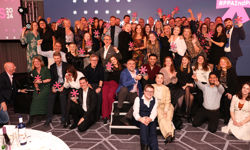
At first glance, you might not think edie – the business media brand committed to empowering sustainability, energy and environmental professionals of all levels to lead the climate emergency response – has much in common with Netflix. But you’d be wrong. And the reason, according to edie’s content director, Luke Nicholls, is all about culture.
Founded more than 20 years ago, edie is now a network with its flagship website at the centre, powering the brand’s content. On top of that, a portfolio of content-led sustainability and energy events bring that content to life. There’s also Net-Zero Live, its sustainability and energy exhibition; the Sustainability Leaders Forum and Sustainability Leaders Awards; and, finally, three dedicated communities of sustainability, energy and future business leaders.
edie’s mission is to build an army of change-makers – from young, aspiring sustainability and energy professionals through to senior, top level decision-makers – to tackle the climate emergency and transform business for good.
In its pursuit of this goal, the brand has won a number of awards – including Best Online Brand and Digital Editorial Team of the Year at the Association of Online Publishers Digital Publishing Awards in October.
And it is team and teamwork that Nicholls, PPA Publishing Innovator of the Year (2018), believes has been the key to its success.
A turning point, he thinks, was edie owner Faversham House’s decision to create the position of content director. He describes the position, which he is the first to fill, as “a vital bridge” between the content and sales, marketing and events teams.
“It is really very important that someone can act as a go between, between the content – what brings people to the edie website in the first place – and the way it is then marketed and sold through other things, like events,” he explains.
edie’s is, for now, a traditional sponsorship and advertising business – a model which, in the near future, it hopes to evolve into a paid membership model. Until then, however, sponsorship and advertising revenues are its engine, and ensuring the editorial and sales team understand and are open and engaged with each other is key.
“Knowing your core audience is the starting point for everything. But it’s also important to bridge gaps that might exist between divisions: content and sales, events and marketing … especially sales,” Nicholls continues.
Between 2017 and 2018, sponsorship revenue rose significantly thanks to clearer communication and better-quality conversations around the content that was sold to a sponsor, and how to make that content work as well as it could to meet the needs of that sponsor and its audience.
In essence, it’s been about making the link between sales and content more integral and doing so with integrity.
“Your team, the way you manage your team and the culture you build are critical – especially if you’ve a small team, but regardless of team size” he adds, outlining three ways in which he tries to ensure a positive culture.
It’s important to bridge gaps that might exist between divisions.
Encouraging openness
One is around the concept of ‘radical candour’.
“This is an idea introduced to us by one of our non-executive directors, Phil Ives, who does management training and coaching. It’s about honest and open feedback two ways – from manager to employee, and employee to manager,” Nicholls says.
“We have spent a great deal of time at edie and Faversham House trying to build a culture to give our people the freedom and courage to give open feedback across the office or to others or to disagree, perhaps, with someone – even someone in a position of authority in a team meeting. As long as we are all coming from the same place, this openness is key.”
The concept is now a phrase they use to make openness a little easier.
Another approach is ensuring absolute clarity and openness for all around what the business is working to achieve, he says citing the book ‘Powerful: Building a Culture of Freedom and Responsibility’, written by one of the co-creators of Netflix’s distinctive (and high performing) workplace culture.
“The ideal is that if you stop any employee in the company – in a break-out room or elevator – and ask them five of the most important things the company is working on right now and for the next six months, that person will tell you, rapid fire, one to five,” Nicholls continues.
“And they will do so ideally in the same words used when it was presented to them and, if they are really good, in the same order. If they can’t do that, then the heartbeat in the business and across the brand is not strong enough.”
Having a culture of everyone – reporter, editor, or someone working in events, sales or marketing – brought into the overarching strategy and goals of the brand ensures a lot of barriers and bridges can be repaired and strengthened, he says.
A final string to Nicholls’ bow is a tip he says has been especially useful over the past twelve months while mainly working remotely: the ‘16Personalities’ test, which is free and online.
“It gives you a breakdown of your natural tendencies – the ways you like to work – and compares you to celebrities and well-known personalities with similar personality types and tells you how to get the best out of yourself,” he explains.
“It’s a bit of fun, but it also gives you something to anchor back to in some of those awkward management conversations. Everyone has little things that need to be focused on when being managed, and this is a nice way of ensuring more management is more bespoke.”
The way you manage your team and the culture you build are critical.

You can hear Luke Nicholls being interviewed by Ciar Byrne on a recent episode of The InPublishing Podcast, which was sponsored by AdvantageCS, a leading global provider of subscription and membership management software.
This article was first published in InPublishing magazine. If you would like to be added to the free mailing list, please register here.












